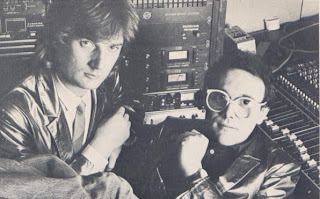Here's a concept I've briefly touched on before - even though I have lots of records, I don't really think I'm a collector. In many ways I'm much more of an accumulator.
On Saturday me and my little brother became way too excited (for grown men!) about the one-day-only opening of a pop-up record shop in Durham. Ever since the closure of our beloved HMV (I shopped there regularly so it wasn't my fault) we've been cut adrift, so, cash in hand, off we popped.
And what a strange experience it turned out to be. For a start there were no second-hand records there, even though the publicity said that there would be. Then (and this was the frightening bit) we noticed that we were the only customers over the age of 25. In some ways this was heartening; maybe the future of vinyl is safe in the hands of these young whippersnappers. If we're all hoping for a vinyl revival as a result of purchasers over the age of 40 then our plan could be fatally flawed.
So we looked briefly through the new vinyl, while someone sitting on a stool played a guitar in the front of the shop. The performance was very much appreciated by the young customers in their woolly hats (in 30 years they'll laugh about wearing woolly hats all year round just like we laugh about flares or ankle-warmers now).
To cut a long story short, we looked briefly through the new LPs (most priced between £18 and £22) for what we felt was a respectable length of time, then left with the plan to go hotfoot to the brilliant ‘Just the sound’ second-hand record shop in nearby Houghton le Spring (which opened at about the same time as the Durham HMV closed, strangely enough), where we spent a much longer time poring (and pawing) over the thousands of records on display. We were offered a cup of tea and even allowed a brief look into the legendary back room!
Around an hour or so later we emerged with an armful of vinyl apiece, me £11 lighter but with eight LPs (including two doubles) to show for it. A pretty diverse selection it was too, I think you’ll agree;
Donna Summer - On the Radio: Greatest Hits volumes 1 & 2 (£4)
I already own this collection on slightly mangled cassette so I know how good it is. It also comes with the major advantage of a Giorgio Moroder production that includes the full 'Moroder-style' segueing of the tracks, which is worth the cost of admission alone.
The Cars - Heartbeat City (£1)
I haven't listened to this one yet, and am generally of the opinion that The Cars earlier albums are the most exciting, but for only £1 I thought I should give this a chance.
Al Stewart - Past, Present and Future (£1)
In common with most Radio 2 disc jockeys, I absolutely love the work of All Stewart (don't ask me why but I fear nostalgia plays a large part)
Gerry Rafferty - Night Owl (£1)
In the early 1980s, driven by the fear that my tastes were becoming too middle-of-the-road, I sold some albums. Gerry Rafferty's 'City to City' was one and 'Night Owl' was another. 'A farewell to kings' by Rush was another if you must know!
Art Garfunkel - Scissors cut (£1)
I've had a few twitter conversations recently with the legendary Dave Stephens about 'Phonebook voices' - singers who have voices that are so good that you'd happily listen to them singing their way through your Yellow Pages, or even Thomson's Local. Art has such a voice and I have most of his solo work. On some of his albums the song writing on display is wonderful - on others the phonebook option could be preferable.
Simon and Garfunkel - The Concert in Central Park (£1)
Paul's 'American Tune' is one of the most beautiful songs ever written, and here performed in tandem with the guy with the funny hair, it's even better. 95% of live albums are pretty ropey – this is one of the 5% that isn’t.
Prince - Purple Rain (£1)
I'm not a 'completist' as you know, but if there are any artists that I'm prepared to make an exception for it would be Jonathan Richman and Prince. I have owned 'Purple Rain' on cassette for around 30 years now, and I just thought it would be nice to have a vinyl copy too.
Harry Belafonte - Belafonte returns to Carnegie Hall (£1)
Harry is the proud owner of another 'Phonebook voice' - as long as they're not too pricey I always buy any Harry that I come across. I do the same with Nina Simone and Ken Boothe.
I then brought all of my wonderful purchases home and put them with the rest of my record accumulation in the music room (of which I'll be writing more in the forthcoming weeks).
Soundtrack to this post - Spiritualized 'Songs in A&E'
You can now subscribe to this blog on your Kindle – Just look up 'For the love of vinyl (….and cassettes!)’ and sign away 99p a month and it’s all yours, or…
You can buy the Kindle book ‘The great cassette experiment - The first 40 days' by following the link below;
Thanks for reading!












